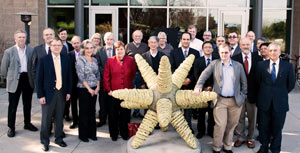
Handy Links
SLAC News Center
SLAC Today
- Subscribe
- Archives: Feb 2006-May 20, 2011
- Archives: May 23, 2011 and later
- Submit Feedback or Story Ideas
- About SLAC Today
SLAC News
Lab News
- Interactions
- Lightsources.org
- ILC NewsLine
- Int'l Science Grid This Week
- Fermilab Today
- Berkeley Lab News
- @brookhaven TODAY
- DOE Pulse
- CERN Courier
- DESY inForm
- US / LHC
SLAC Links
- Emergency
- Safety
- Policy Repository
- Site Entry Form

- Site Maps
- M & O Review
- Computing Status & Calendar
- SLAC Colloquium
- SLACspeak
- SLACspace
- SLAC Logo
- Café Menu
- Flea Market
- Web E-mail
- Marguerite Shuttle
- Discount Commuter Passes
-
Award Reporting Form
- SPIRES
- SciDoc
- Activity Groups
- Library
Stanford
Around the Bay
Linear Collider Funding Group Meets at SLAC
The Funding Agencies for Large Colliders, or FALC, met at SLAC Saturday as part of the group's continuing efforts to shepherd progress toward a next-generation linear collider. FALC members represent funding agencies and governments from around the world. The focus is on communication, explained Walter Davidson, director of the National Research Council of Canada and the current chair of FALC.
"Any future linear collider will be of such magnitude—funding and otherwise—that it must be truly international," he said. The group tracks such issues as "where and how—questions of governance, questions of funding," Davidson noted. "Currently, where [a next-generation collider] is going to be located is becoming more important."
The group keeps an eye on how technical advances might affect funding, and how scientific advances might affect the finished product. Case in point: the Large Hadron Collider. How the large collider fares in its search for the Higgs boson may strongly influence the technology used to build the next big linear collider. Should the Higgs prove beyond the reach of the LHC, the demands on its successor, whether linear or not, will grow substantially.
FALC is tracking a few different designs, including one in the works from the International Linear Collider Global Design Effort and another, called the Compact Linear Collider, being led by CERN.
Although FALC has been in existence since 2003—with a minor name change but no deviation in purpose—the group is still learning and developing. Davidson knows that FALC breaks new ground, but so does a truly international global effort to build a facility of this magnitude for high energy physics.
"It's unique because the world has never come together like this for such a large scientific enterprise," he said. "And if we do it right, maybe we can serve as a model for other international endeavors."
—Lori Ann White
SLAC Today, January 25, 2011
